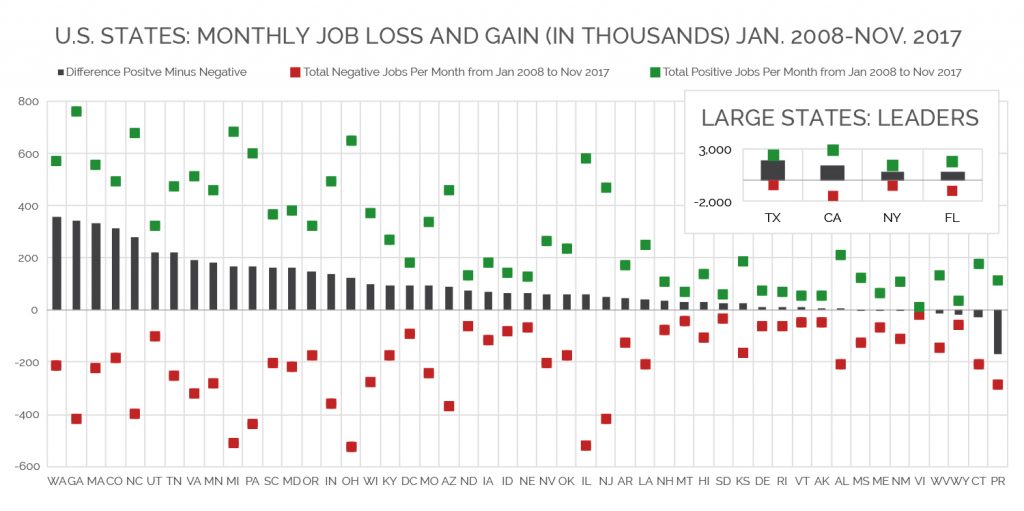Net Job Gains Continue Growth Potential

The fact that job growth has been relatively slow in the almost nine years since the Great Recession ended may end up being a positive as the current recovery steams closer to the post-World War II record of 120 months. Net job gains show that growth can continue.
Though the recession technically ended in June 2009, job gains did not turn positive until March 2010 and didn’t really start accelerating until later that year. Today, the positive job gains since January 2008 are 71% higher than the negative job gains in the same period.
In only seven of the 53 states and territories tracked – the 50 states, plus the District of Columbia, Puerto Rico and the U.S. Virgin Islands – were job losses greater than job gains from January 2008-November 2017. Because negative job growth has been very rare in any state since the end of 2010, that means that most of the states and territories have more than made up for the jobs lost during the recession.
Of course, individual major metros have lost jobs in certain months since then. The most recent case was Houston, which sustained negative job growth in June, July and August 2016, when the oil industry was shedding workers because of the drastic drop in oil prices in the previous year.
This shows that momentum is strong, and there’s room to grow, according to RealPage economists. For the apartment market, the figures signal continuing increases in demand.
Nationwide, the sum of all positive job gains for all months from January 2008-November 2017 was 22,619,000, compared to negative job gains of 13,259,000, for a net job gain of 9,360,000 in the 9-year, 11-month period. That translated to average job gain of 943,530 per year.
But 2,108,000 jobs were added in the year ending November 2017, according to the Bureau of Labor Statistics, which is close to the average when including only positive job-gain months. Those 22,619,000 jobs divide into an annual average of 2,280,090, most of which reflect recovery years.
As seen in the chart below, the most populous states – Texas, California, New York and Florida – have achieved the highest net job gains in the almost-10-year period:

- Texas, thanks to employment booms at various times in Houston, Dallas, Austin and the Midland-Odessa area, added a net 1,882,900 jobs.
- California, with its burgeoning Silicon Valley tech companies, established 1,443,600 new positions.
- New York City generated most of the state’s 783,300 jobs.
- Florida, with periods of strong growth in every part of the state, added 744,600 jobs.
Washington State (primarily Seattle) rounds out the top five with a net job gain of 355,500.
The seven states/territories in which job losses surpassed job gains in the past decade were led by Puerto Rico, which has lost a net 168,700 positions since January 2008. During the period, the island did not experience continuous periods of positive growth, in that, positive and negative job gain oscillated during recovery months. The strongest months for Puerto Rico job gains came in November 2017, as recovery efforts from hurricanes Irma and Maria continue on the devastated territory.
Connecticut has experienced the biggest net job loss among the 50 states (-27,800), with its jobs recovery not starting until March 2010. The Nutmeg State’s industrial nature and volatile Hartford job market has prevented from recouping the recessionary job losses, shedding jobs even during the recovery years when rest of the states showed solid job gain.
Other net job losers were Wyoming (-19,400), West Virginia (-12,100), the Virgin Islands (-6,600), New Mexico (-3,600), Maine (-1,500) and Mississippi (-1,300). Alabama’s November job gains placed it in positive territory for the first time during the period (+3,500). Based on current trends, Mississippi and Maine could turn positive after the BLS announces December’s figures in early February.
The job market may not have exploded since the Great Recession ended, but as “The Tortoise and the Hare” reminds us, slow and steady often wins the race.






